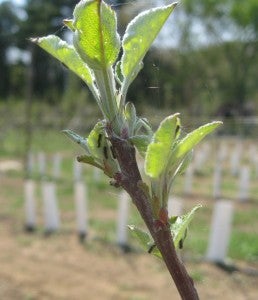Friday the 13th and fire blight and gypsy moths
According to one fire blight model there’s a potential fire blight infection period Friday and Saturday May 13 & 14, in Rhode Island (except Newport County). You can see this on Orchard Radar at
https://extension.umaine.edu/ipm/ag-radar-background/ag-radar-apple-sites/ri-greenville-apple/#FIREBLIGHT
The following is from Jon Clements at UMass: In blocks with a history of fire blight, where trees are in bloom (Gala, Honeycrisp come to mind), growers should consider streptomycin sprays.
An application of streptomycin will protect open blossoms for the life of that blossom. Streptomycin should be applied within 24 hours of an infection. Infections do not start until water washes bacteria in flowers to the bottom of flower, so rain or heavy dew are needed. The warm weather has built up bacterial populations, and rain Friday and/or Saturday can potentially cause infection. Application as close to the infection event (wetting) as possible is the most effective. An application rate of 24 oz. per acre is recommended in most apple/pear orchards where there is a lot of bloom.
Gypsy moth caterpillars started hatching a couple of weeks ago and started dispersing this week. These caterpillars will be killed by applying insecticide at petal fall. Be sure to check newly planted trees or non-bearing trees and spray these trees too if you find caterpillars. Attached is a picture of a new apple tree with lots of small, black, hairy gypsy moth caterpillars.
Check your blueberries too. If you find many gypsy moths on your blueberries spray with a Bt insecticide since blueberries will be in bloom for quite some time and you don’t want to harm your pollinators.

Gypsy moth caterpillars on new apple tree
 Home
Home Browse
Browse Close
Close Events
Events Maps
Maps Email
Email Brightspace
Brightspace eCampus
eCampus


